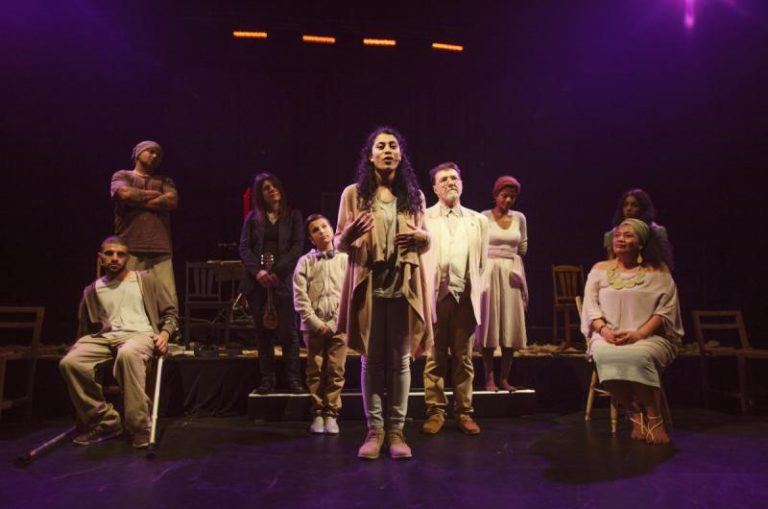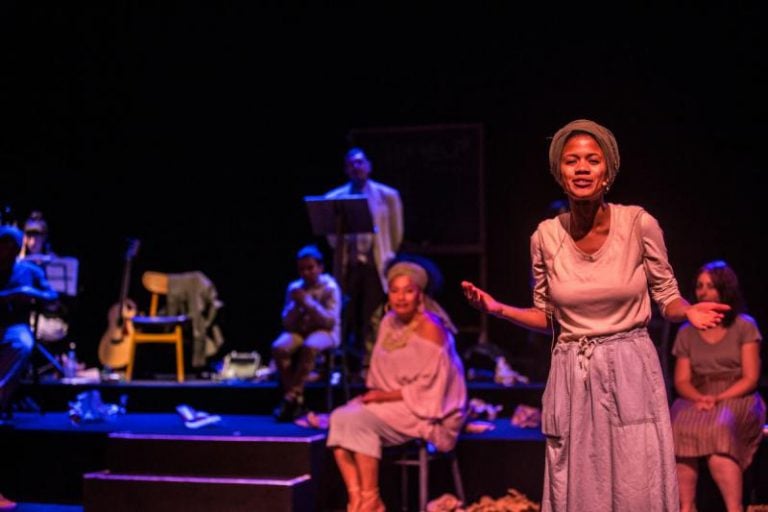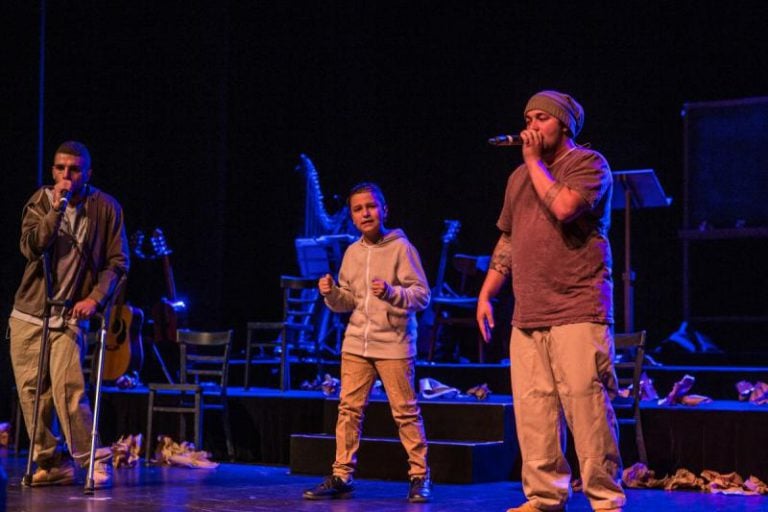John Lennon once said an artist’s role is to “try and express what we all feel. Not to tell people how to feel. Not as a preacher, not as a leader, but as a reflection of us all”.
And it is ultimately with this in mind, that Outer Urban Project’s artistic director Irine Vela is setting out to represent the true voices of Australia with her intergenerational stage show Poetic License.
Entering its third run following sellout seasons at the 2014 Melbourne Writers Festival and 2015 Darebin Arts, the show is inspired by Aristophanes’ The Frogs, a comedic masterpiece set in Athens amidst a civil war. A literary debate unfolds between the late poets Aeschylus and Euripides, who each argue the merits of their own poetry with Dionysus appointed as judge to decide which poet should be brought back from the dead to save the city.
“In Aristophanes’ mind it is poetry that will save the city – it is culture. So this is what we’re really exploring. It’s a reimagining of a very ancient text in a totally contemporary way,” Vela tells Neos Kosmos.
Poetic License, which features artists spanning eight decades and various ethnicities, integrates text, music, and poetry and explores the themes of our times: racism and colonialism, fear and political rhetoric.

But Melbourne, Australia in 2017 is a very different world to the Athens of antiquity, so what does Poetic License, or more specifically poetry, have to offer society today?
“I guess that’s the question Aristophanes asked 2,500 years ago,” Vela says with a smile.
“Art, writing, can bring us in touch with ourselves and also in touch with other people. It generates empathy, understanding, in a way that you can’t do in a school textbook or you’re not going to get on the news. As many horrifying images as you see, it doesn’t necessarily bring you close to understanding tragedy of war – in fact, it can be distancing. But hearing a Koraly (Dimitriadis) or a Grace Vanilau or any of our performers, you hear the bearing of their souls.”
She recalls a time that poetry was seen as “daggy”, but with the emergence of Melbourne Spoken Word online community and the freedom afforded to poets through the internet to instantly connect with their audience, poetry is going through a renaissance; one which Vela experienced firsthand among the youth of the outer northern suburbs leading her to create the show.
“We work with a lot of very young rappers and it’s a form of poetry. So what we wanted to do was to investigate rap poetry,” she recalls, and one of whom, 15-year-old Dante Sofra, is returning this season.
Among the performers are comedian and social activist Rod Quantock; singer, writer, weaver, and orator Grace Vanilau; alternative jazz vocalist and neo-beat poet Ileini Kabalan; hip-hop artist Mahmoud Samoun (aka Babz) and a poet performer of freefalling and confronting emotion, Koraly Dimitriadis – a combination of new and old-school poets, which Vela says is important in showing the history behind any narrative.
“I love intergenerational work, and that’s why I love this show because you’ve got your young guy and you’ve got your 70-year-old. You’ve got every decade represented because that’s the world. There are many voices, so what you’re seeing is the sheer humanity,” she says.

Dimitriadis, who is well-known both in Australia and abroad for her book of poetry Love and Fuck Poems and her one-woman shows exploring feminist themes, was headhunted by Vela to take part back in 2014 and says she welcomes the opportunity to take part once again and present her work to a wider audience.
“There’s different age groups, different ethnicities, everyone has come from completely different experiences and bringing all those together, it’s very powerful. Every time I perform this show it feels very powerful; I feel like I’m a part of something bigger and really important,” Dimitriadis says.
An excerpt from her contribution reads: ‘I won’t fill this needle, I won’t fill this needle with fear and inject it into my daughter’s veins . . .’
“I talk about the fear that was injected into me through my culture; my parents’ fear and what happened to me because of that and how I overcame it to teach my daughter that life is beautiful, we don’t need to live in fear,” she explains.
For Dimitriadis the show is a demonstration of poetry’s power and its ability to heal people when presented in an accessible, raw, and honest way, which she admits to having experienced firsthand.
“We’re all talking about our fears, and our world, and coming to a place realising that there is hope in this world by sharing stories and coming together.”
Where Dimitriadis shares the experiences of a Cypriot Australian woman, Milad Norouzi explores those of an Iranian refugee to Australia.
Norouzi’s presence in the show is of particular significance, having first been a member of the audience back in 2015 together with his case worker, after which he approached Outer Urban Projects and joined their rap tutorials.
“He was a very shy, dare I say, quite depressed young man at the time. By the end of that year he was onstage at Melbourne Festival performing in front of a huge audience in English and what’s beautiful is that he has just been cast in this season of Poetic License. He’s now part of the artistic fabric of Melbourne from a place of despair to, I think, a place of being connected with fellow artists,” Vela says.
While in the original Dionysus chooses the old school poet Aeschylus as the winner – sorry to ruin for you – Vela says that Poetic License is taking a different approach in 2017 in which the poet is able to express themselves freely without judgement.
“How many people have the ability to write their innermost thoughts, and the ability to be naked? To be truthful about what you think is one of the most difficult things that you can do in the world and not every artist can do that. But that’s really what makes great art, it’s coming to some truth and that brings us in touch with ourselves and in touch with others. And that’s perhaps, if there’s going to be any salvation, where it lies for me – within ourselves,” she says.

This year’s Poetic License will see the launch of the Outer Urban Projects artistic program for 2017/18.
Going with the Greek theme of Aristophanes, the show will kick off with a performance by Vela’s ARIA Award-winning group the Habibis with traditional
and contemporary music from Greece, Anatolia, the Balkans and the eastern Mediterranean, joined by surprise guest musicians each night.
For Vela, Aristophanes’ work holds a particularly special place in her heart. Having experienced a reenactment of The Frogs at the Fairfield Amphitheatre, she also has the opportunity to study the work at university.
“The reason I got very excited about Aristophanes when I was at university was because I connected as a Greek Australian – it’s from my mother’s dreamtime. And what essentially got me into being an artist was my sense of Greekness too,” she reveals.
“Racism was very strong in the 60s and 70s when I was growing up and I was taunted a lot. But rather than totally assimilate, for me, I was proud that I had this culture that is strong, and I have access to my own special culture which you don’t have and I want to share it with you. That was really how I became an artist, that’s what motivated me and that’s why I would love Greeks to come and see this.”
In contrast for Dimitriadis, her Greekness has often had the opposite effect; rather than being of intrigue and freeing her personal expression, it has been a hindrance and one that she is time again challenged to overcome.
“Expressing these stories is more important to me and making women feel heard is something that’s important to me because for a long time in my life I didn’t feel like I was being heard. So it’s a healing process for me and for other women that I’ve put before the cultural aspects. Especially in Greek culture it’s like what are people going to think? And I grapple with that all the time,” she says.
And it is precisely that strength and willingness to go against the status quo that Vela is in awe of, and wants to celebrate through Poetic License.
“The show is making a statement without even intending to. Poets for me are very radical personas because the great poet says what they think in the most eloquent and economical way that’s possible. So for me they are truly revolutionary because they don’t want to necessarily fit in,” she says.
“Really, the theme is can language change anything? Can it inspire? Can it really make a difference? Maybe not always, but it’s all we’ve got.”
‘Poetic License’ runs from 20 -24 June (opening night Wednesday 21 June) at fortyfivedownstairs (45 Flinders Ln, Melbourne, VIC). Performances 11.00 am and 7.00 pm Tues-Fri, 7.00 pm Sat. For bookings call (03) 9662 9966 or visit fortyfivedownstairs.com. An artist Q&A follows all 11.00 am shows. The Habibis perform at all 7.00 pm shows.









